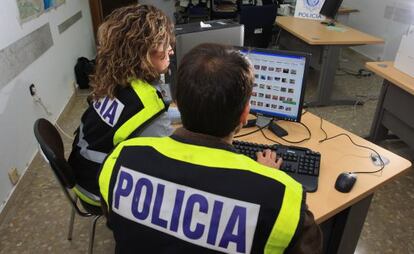Why 95% of cybercrimes committed in Spain are going unpunished
Ministry report into digital offenses highlights dangers to society, the economy and infrastructure

Around 95 percent of cybercrimes, or offenses related to new technologies, are going unpunished in Spain, according to a new report from the Interior Ministry. ¡°The phenomenon of cybercrime is of significant international and national importance, not only for the threat it represents to society, but also for the dangers it poses to the economy and key infrastructure,¡± reads the report.
Over the last year, Spain¡¯s security forces received 42,437 complaints for sexual offenses, fraud, forgery, threats, scams, and illegal interception of emails. Of these cases, only 2,167 have been resolved. The Interior Ministry admits that this is a very low percentage, ¡°compared to police successes in criminal cases (37 percent) or robberies and theft (23.9 percent).¡±
Last year the security forces received 42,437 complaints for sexual offenses, fraud, forgery, threats and scams
The speed, anonymity and ease of opportunity that new technologies offer are encouraging criminals to attack computer systems to illegally remove data, as well as stealing individuals¡¯ identities, engaging in activities related to pederasty, phishing (posing as a bank or other reputable institution to acquire sensitive information), and sending out viruses and malware. The global reach of these criminals has alarmed governments around the world, which have responded by introducing new laws. One such example is the Budapest Cybercrime Convention of 2001, to which Spain signed up in 2010.
The Budapest Convention aims to prevent crime such as breaking into computer systems, intercepting or interfering with online networks, the manufacture and sale of programs and devices for interfering with computer systems, altering or removing databases, internet fraud, child pornography and copyright infringement. But Spain¡¯s Interior Ministry is also warning about cases of blackmail, drug trafficking and defamation, which are not included in the Budapest Convention.
Two-thirds of the 42,437 offenses reported to Spain¡¯s police forces in 2013 were related to fraud; blackmail, threats and coercion made up 20 percent.
The global reach of these criminals has alarmed governments around the world
On December 5, 2013, the government approved its National Cybersecurity Strategy, ¡°aimed at meeting the enormous challenge posed by preserving cyberspace from the risks and threats facing it.¡± The secretares of state for security and telecommunications have also signed an agreement to cooperate in the fight against cybercrime.
Both the Civil Guard and the National Police have put more resources into units that fight digital crime. Last year, some 5,000 people were arrested for their involvement in 2,167 crimes. The Interior Ministry points out that this means that the average cybercrime involves 2.33 people, ¡°indicating that those responsible tend not to act alone, but are part of organized groups.¡±
Hiding in the Cloud
Europol¡¯s European Cybercrime Center (EC3) and the European Commission say that the Cloud (virtual data storage centers accessible via the internet) represents one of the main challenges in dealing with cybercrime.
¡°Cloud-based services offer many benefits for consumers and business, but they also allow many criminals to store material, rather than keeping it on their own computers, making it more difficult to track them down,¡± said European Commissioner for Home Affairs Celia Malmstr?m in February.
Troels ?rting, the head of EC3, says that most cybercrime takes place from locations outside the European Union, particularly in Africa, where few countries have any data protection legislation.
Tu suscripci¨®n se est¨¢ usando en otro dispositivo
?Quieres a?adir otro usuario a tu suscripci¨®n?
Si contin¨²as leyendo en este dispositivo, no se podr¨¢ leer en el otro.
FlechaTu suscripci¨®n se est¨¢ usando en otro dispositivo y solo puedes acceder a EL PA?S desde un dispositivo a la vez.
Si quieres compartir tu cuenta, cambia tu suscripci¨®n a la modalidad Premium, as¨ª podr¨¢s a?adir otro usuario. Cada uno acceder¨¢ con su propia cuenta de email, lo que os permitir¨¢ personalizar vuestra experiencia en EL PA?S.
En el caso de no saber qui¨¦n est¨¢ usando tu cuenta, te recomendamos cambiar tu contrase?a aqu¨ª.
Si decides continuar compartiendo tu cuenta, este mensaje se mostrar¨¢ en tu dispositivo y en el de la otra persona que est¨¢ usando tu cuenta de forma indefinida, afectando a tu experiencia de lectura. Puedes consultar aqu¨ª los t¨¦rminos y condiciones de la suscripci¨®n digital.








































